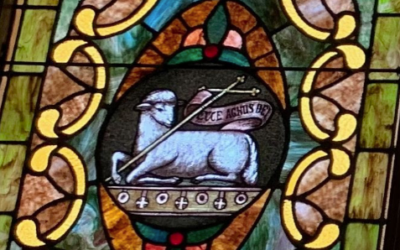Advent 2 – Prepare the Way for the Lord
Watch the service

Read the sermon
Prepare for the Day of Christ
You shared in my sufferings. Years ago I watched the show, “Band of brothers.” It was a long TV series that walked through a unit of soldiers who fought in WW II. And what the show did a faithful job of showing, especially at the end, was how their shared experiences knit them closely together with each other, but then, oddly, when they came home they felt separated from those they were supposed to be closest to. Sharing in suffering does that to people. As we read these words of Paul here, we see that these shared sufferings did the same to Paul. Paul dearly cared for all the churches he shared the gospel with. But there was a special, unique bond that Paul had with the Philippians. For they suffered persecution right alongside him, in the same way as he was. That stuck with Paul. That shaped Paul. And as a result, when he was alone in prison, he could not help but think of them. And he could not help but pray for them. And in these words we have the privilige of hearing what Paul prayed for. In these opening word of Paul’s letter, we read: “3 I give thanks to my God for every remembrance of you, 4 always praying with joy for all of you in my every prayer, 5 because of your partnership in the gospel from the first day until now. 6 I am sure of this, that he who started a good work in you will carry it on to completion until the day of Christ Jesus. 7 Indeed, it is right for me to think this way about all of you, because I have you in my heart, and you are all partners with me in grace, both in my imprisonment and in the defense and confirmation of the gospel.” (Phil. 1:3–7 CSB17)
Paul lets them know that the one who began a wondrous good work in them will carry it across the finish line. What is this good gift that Paul is speaking about? He is speaking about faith and repentance. This morning we are going to set aside some time to speak about repentance.
First, what is repentance? When I was a child I was told on more than one occasion that I needed to repent of what I had done. And over time I arrived at the conclusion that repentance meant feeling bad. And, my dear friends in Christ, that’s a beginning of an understanding. But it’s not the better understanding. Repentance is an absolute change of heart and mind.1 It’s this profound change inside of us where we do not look at the world or ourselves in the same way as before. Before repentance Christmas is the time when we get presents and eat too much sugar. After repentance Christmas is this cherished time of the year because it shows this amazing love that God had for us that he took on human flesh and blood to save us from our sins.
And it’s important to note that no person before God creates faith in their hearts has repentance. God is the one who creates repentance in us. We don’t have it by default as we come into this world. God’s word tells us: “The person without the Spirit does not accept the things that come from the Spirit of God but considers them foolishness, and cannot understand them because they are discerned only through the Spirit.” (1 Cor. 2:14 NIV11-GKE)
That’s what repentance is: a change of heart and mind. But in these words Paul answers another question: how long is it good for? When I was a child we would visit grandma’s house. And she would have a jar full of candies. In the early years this was the first place we would stop when we arrived. But later on, she didn’t put new candies in the jar. So they got old and tasted horrible. Notice how Paul goes out of his way to tell the Philippians that repentance is not like that. When Jesus gave them faith in him he also gave them repentance. And that repentance would be with them until Jesus returns on Judgment Day.
How wonderful those words are for both them and us. For we too can ask the question, “will repentance run out?” Like candies in a jar, will our repentance in us run dry and get old? This is a real fear during this time of the year, isn’t it? One of the challenges we have during this time of the year is that we’ve done it all before—often many times. We have heard these parts of God’s word. We have put trees and wreaths and decorations up so many years in a row. And we can look back at the joy that used to be there in our hearts. But now we have gotten used to it. And there remains numbness and boredom. There is numbness toward the joy that should be there as we think about Christmas. But there can also be numbness at the shock that should be there in our hearts at the sin we think of and carry out.
How amazing these words are. For they are a promise to us, that the Savior who created this repentance in us will cause it to be there every day until Christ returns. So we prepare for the Day of Christ. We do so, first of all, by knowing about repentance. But there is another way: “8 For God is my witness, how deeply I miss all of you with the affection of Christ Jesus. 9 And I pray this: that your love will keep on growing in knowledge and every kind of discernment, 10 so that you may approve the things that are superior and may be pure and blameless in the day of Christ, 11 filled with the fruit of righteousness that comes through Jesus Christ to the glory and praise of God.” (Phil. 1:8–11 CSB17)
We prepare for the Day of Christ by knowing about repentance. But notice what Paul tells us. We also prepare for the Day of Christ by growing in repentance. It is true that repentance is not a good work we produce in ourselves. But it is true that is a gift we make use of. The quarterback hands the ball off to the running back. And does he just stand there? No, he runs with it. We do the same with repentance. We make use of it and grow in it.
And this teaches us that there is a problem we have with repentance. What are we supposed to repent of? For there are times we feel bad about sins that are not our responsibility and are not our fault. Or they are not even sins at all. Or, on the opposite side of the coin, there are times, looking back, we realize we should have felt bad about what we were thinking or doing, but didn’t. How do we grow in repentance?
When we realize that this is a real problem for us, then we hear this promise from Paul, and it fills us with hope. In God’s word we grow in knowledge and discernment. As we read and study God’s word we will grow so that we are able to figure out what is good and what is bad. We will be able to figure out also what is most important. That’s the promise. But Paul also concludes with a point. The day of Christ is on its way and could arrive at any time.
Notice then how this repentance, this change of heart and mind, helps us as we walk through life. A few years ago people began to say, “happy holidays” instead of “merry Christmas” during this time of the year. And, sadly, the Christian church did not respond well. It reminds me of when I was a kid in school. There would be that one sneaky kid who would say to me that some other person was saying bad things about me. I would get angry. And on the playground I’d confront the kid who supposedly said the bad thing about me. And we’d very quickly realize that he didn’t say that at all. Instead, it was another kid who lied so that he wouldn’t be bored at recess.
How easily, as Christians, we get sucked into fights that really aren’t that important in the end. So easily we think that the most important issue is that people say, “mery Christmas” instead of “happy holidays.” But when we walk through the bible, we quickly realize that our role as Christians is not to beat people over the head with Jesus, forcing them to speak as Christians even though they are not Christians. We force them to pretend that they have repentance, when, as unbelievers, it’s impossible to show in their words what they do not have already in their hearts. And how much more important this is to consider when we realize that the Day of Christ could arrive at any time.
So my dear friends in Christ, Jesus gives us repentance, but we run with the ball. We know Repentance and then grow in it. And we do so by reading God’s word and studying it. Then our repentance has a place and a home. Then we learn not to be upset by matters that are not that important. And we learn to be upset about matters that are important. And as that happens, Paul’s prayer for the Philippians will be fulfilled in us. We will know repentance—that this gift of repentance will be here when we need it. And we will grow in it. We will read his word deeply so that our repentance would show itself in the right place. Then we will be ready for the day of Christ. Amen.
1 “μετάνοιαν” (Λουκᾶν 5·32 THGNT-T)



